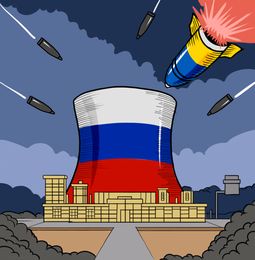The name “Kursk”pierces Russian history like a dagger. At its worst, it stirs gruesome memories ranging from mass slaughter to claustrophobic terror. At its best, high-cost victory. Once again, Russia’s southwestern Kursk area is a battlefield fraught with ominous omens. Ukraine has launched a cross-border offensive into Kursk—the first invasion of Russian territory since World War II.
Deafening was the initial silence from all concerned—Russia, Ukraine and its western allies. For the west, silence is better than defending Ukraine for violating an international border, a crime they accuse Russia of for invading Ukraine. Experts explained the incursion aimed to divert Russian forces away from the eastern battlefront where Ukrainian troops are failing and that staging a successful offensive bolsters flagging western support, inducing reluctant allies to supply more weapons.
Ukraine’s incursion appears to have caught Russia off-guard. President Vladimir Putin’s silence and his soldiers’absence from the Kursk battlefield revived memories of Russia’s “unsinkable”500-feet long nuclear submarine “Kursk”. In 2000, it sank in the Arctic with 118 trapped men on board. Even a day later, Putin was filmed partying and barbecuing in his Black Sea holiday villa. The slow and inept Russian rescue operation culminated with British and Norwegian divers eventually opening the hatch—to find no survivors.
Days after Ukraine’s offensive, President Volodymyr Zelensky thanked his western allies for “supporting”the incursion—a fait accompli that arguably exposed allied complicity. Putin said the Ukrainian attack aimed to seize Russian territory for use as leverage in future negotiations with Moscow. Analysts concluded this was a compelling, though dangerous, motive—because it invites brutal Russian retaliation. Besides, conquering territory is daring, holding it, perilous.
Whether Donald Trump or Kamala Harris wins the US elections, Ukraine knows it will be pressured into a peace deal—American voters are bothered by their own problems. Ukraine also expects the deal’s terms to be worse under Trump, whose bromance with Putin is legendary. The US will largely determine the trajectory of war and peace. Experts here are baffled by Prime Minister Narendra Modi’s visit to Ukraine. China, Turkey, the UAE, Saudi Arabia and other peacemakers circle the Russia-Ukraine war zone, but the US arguably prefers India as an interlocutor given its non-aligned and democratic status.
Historically, Russia thwarted invaders at great cost. Napoleon and Hitler failed to conquer the Russian heartland. The Battle of Kursk in 1943 between the Nazis and the Soviets was a turning point in World War II. Russia won the battle but lost seven lakh soldiers, 1,100 aircraft and 6,000 tanks. It was the biggest tank battle in history. In today’s war, Russia and Ukraine have already lost an estimated five lakh soldiers. Both bleed, but Ukraine bleeds more with smaller population and higher civilian casualties. Territorial barter seems a natural face-saving manoeuvre to end the war. Until then, defying expectations, Putin aggressively bombards Ukraine’s capital Kyiv and eastern areas.
The threat of a nuclear attack or accident has thrummed throughout this war. More so now. Kursk, a region of 1.2 million people, has a nuclear power station well within the range of the Ukrainian invaders’ artillery, fired from western-supplied howitzers and rocket launchers. Rafael Grossi, head of International Atomic Energy Agency who is inspecting the Kursk plant on Russia’s invitation, said, “It’s a Chernobyl-type plant with no protective dome and totally exposed reactor core. Since there is combat, I’m very concerned.”In 1986, a reactor in Ukraine’s Chernobyl plant exploded. It was and remains the world’s worst nuclear disaster.
Pratap is an author and journalist.


